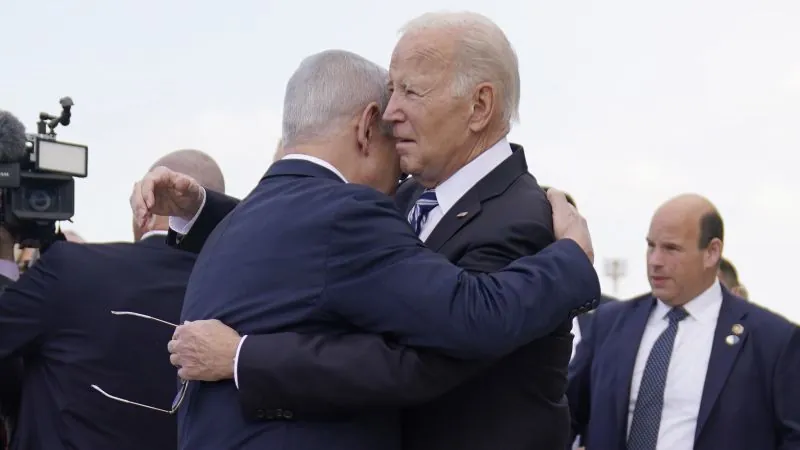
Inside the Turbulent World of U.S. Leadership: Bob Woodward's Revealing New Book Uncovers Biden, Trump, Harris, and Putin's Raw Conversations
2024-10-09
Author: Jessica Wong
In his latest book "War," acclaimed journalist Bob Woodward provides a gritty, unfiltered glimpse into the high-stakes world of U.S. diplomacy, showcasing candid dialogues between President Joe Biden, former President Donald Trump, Vice President Kamala Harris, and Russian President Vladimir Putin. The book is set against the backdrop of multiple global crises, from the war in Ukraine to ongoing tensions in the Middle East, offering readers a front-row seat to the personal and political turmoil facing American leaders.
Among the intense revelations, Biden did not hold back in expressing his frustration regarding Israeli Prime Minister Benjamin Netanyahu, stating, “That son of a bitch, Bibi Netanyahu, he’s a bad guy!” as tensions escalated over the Gaza conflict. In similarly stark terms, regarding Putin, Biden labeled him “the epitome of evil,” reflecting the deep animosity that has characterized U.S.-Russia relations since the invasion of Ukraine.
The book goes beyond Biden's interactions, bringing to light Trump's contentious relationship with Putin as well. Woodward exposes that Trump allegedly sent personal Covid-19 testing equipment to the Russian leader during the pandemic – an action Trump has denied, claiming he had “absolutely no access” to Woodward’s information for the book.
"War" meticulously details significant moments of Biden's presidency, including the chaotic withdrawal from Afghanistan, which resonated profoundly throughout his administration, and the fraught negotiations leading up to Russia's military actions. Interestingly, Woodward highlights the stark improvement in U.S. intelligence operations, presenting revelations that U.S. intelligence identified Putin's plans to invade Ukraine long before the action happened, signifying a new era of precision in geopolitical strategies.
Among other nuanced accounts, the book makes the shocking claim that at one point, Biden's advisors assessed a grim 50% chance that Putin would resort to using nuclear weapons in Ukraine. This escalating fear brought about urgent conversations, illustrating the tense atmosphere in the Oval Office as leaders grappled with the unfathomable consequences of a nuclear conflict.
Moreover, Biden's criticisms extend to former President Barack Obama, whom he believed mishandled Putin's earlier aggression during the 2014 Crimea invasion. In discussions, Biden expressed that Obama “never took Putin seriously,” leading to the current precarious situation.
Harris's role in these intense discussions comes into sharper focus, with her expressing concern about Biden’s interactions and the pressure he faces. Woodward reveals poignant moments where she urged Biden’s close associates to foster more supportive communication with him, illustrating the sense of isolation that beset the presidency.
Tensions also simmered between Biden and Netanyahu amid the recent conflict in Gaza. During a January call, Biden confronted the Israeli Prime Minister, implying that Netanyahu lacked a clear strategy to address the crises at hand. This friction highlighted the complexities of U.S.-Israeli relations, where public support for Israel is often at odds with the darker realities of their military operations.
The narrative reveals that even amidst these monumental global shifts, strategists within the Biden administration harbored fears about the potential fallout from conflicts that could extend far beyond their immediate grasp – ultimately leading to conversations that encompass the possibility of war, humanitarian crises, and global repercussions.
Adding to the drama, Woodward recounts discussions with Saudi Arabia's Crown Prince Mohammed bin Salman (MBS) about normalizing relations with Israel, including a curious exchange where a suggestion to call Trump was made, revealing the enduring influence of former leaders on current affairs.
As Biden faces mounting pressures, further insights into the dynamics of his administration emerge, showcasing a leader grappling with his past decisions, including his controversial choice of Attorney General Merrick Garland. The internal struggles, particularly around the ongoing legal troubles of his son, Hunter Biden, reflect a deepening conflict between personal and professional spheres.
Ultimately, Woodward's "War" is not just a behind-the-scenes account of major political figures but a stark portrayal of the moral and strategic dilemmas that shape modern governance, complete with raw language that underscores the emotional weight behind decisions made in moments of crisis. This meticulous exploration serves as a vital reminder of the challenges that both current and future leaders will face on the global stage.


 Brasil (PT)
Brasil (PT)
 Canada (EN)
Canada (EN)
 Chile (ES)
Chile (ES)
 España (ES)
España (ES)
 France (FR)
France (FR)
 Hong Kong (EN)
Hong Kong (EN)
 Italia (IT)
Italia (IT)
 日本 (JA)
日本 (JA)
 Magyarország (HU)
Magyarország (HU)
 Norge (NO)
Norge (NO)
 Polska (PL)
Polska (PL)
 Schweiz (DE)
Schweiz (DE)
 Singapore (EN)
Singapore (EN)
 Sverige (SV)
Sverige (SV)
 Suomi (FI)
Suomi (FI)
 Türkiye (TR)
Türkiye (TR)